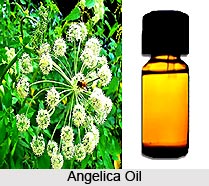 Angelica is best known as the green, candied stem used to decorate cakes. It is grown in Belgium, Hungary, and Germany and is a native of Europe. The Angelica oil is extracted from the root, fruit or seed of the plant. This oil generally detoxifies the body. It can also be used to great effect on respiratory ailments and is a great help in stomach related problems; including flatulence, dyspepsia, nausea, discomfort and indigestion. In aromatherapy, it is a germ-killer, excellent for coughs and colds, flu, muscular aches and rheumatism. It is a rather large, water-loving herb, with broad pointed leaves dividing into smaller leaflets and has small white-green flowers. It has a strong aromatic scent and a large rhizome.
Angelica is best known as the green, candied stem used to decorate cakes. It is grown in Belgium, Hungary, and Germany and is a native of Europe. The Angelica oil is extracted from the root, fruit or seed of the plant. This oil generally detoxifies the body. It can also be used to great effect on respiratory ailments and is a great help in stomach related problems; including flatulence, dyspepsia, nausea, discomfort and indigestion. In aromatherapy, it is a germ-killer, excellent for coughs and colds, flu, muscular aches and rheumatism. It is a rather large, water-loving herb, with broad pointed leaves dividing into smaller leaflets and has small white-green flowers. It has a strong aromatic scent and a large rhizome.
Origin of Angelica Oil
The plant is said to originate from Africa and was introduced to Europe in the 16th century. It is called Angelica, since it normally flowers on the 8th May, which is St Michael the Archangel`s Day, and for this reason it is often planted in monasteries and is referred to as "Angel Grass".
This herb is included in the famous Chartreuse and Benedictine liqueur. When the Black Plague swept Europe, the herb was considered an antidote for it. It is also used to flavor gin, perfumes, and traditionally candied for cake decoration and confectionery.
The essential oil has an earthy, peppery, musky smell. It is a good expectorant, an excellent digestive, and helps with rheumatic conditions, indigestion, flatulence and colic. It has a calming effect on the digestion and is very warming and relaxing. Although essential oils blend and mix well aroma-wise with one another, Angelica oil does go very well with basil oil, chamomile oil, geranium oil, grapefruit oil, lavender oil, lemon oil, mandarin oil and patchouli oil. The Angelica Oil also mixes well with Neroli oil, Rose oil, Rosewood oil and Violet oil. However, the root oil is photo toxic, so one should avoid exposure to sunshine after use or it may cause skin irritations. It is also not to be used during pregnancy.
Uses of Angelica Oil
•This oil relieves spasms and gives relief from the contraction in the respiratory tracts, muscles, nerves, blood vessels, and internal organs resulting in severe coughs, cramps, convulsions, obstructed blood circulations, aches in the stomach and chest, and other symptoms.
•The relaxing effect of Angelica Oil gives immense relief from troubles related to excess gas, such as indigestion, stomach aches, headaches, cramps, flatulence, nausea, and high blood pressure.
•It lowers blood pressure and reduces fat along with giving relief from troubles like rheumatism, arthritis, gout, and renal calculi.
•Angelica Essential Oil increases frequency and quantity of urination, which helps to remove excess water, salts, fat, and toxins like uric acid. This provides effective protection from the symptoms discussed above.
•This oil also triggers the opening of obstructed menstruation and makes it more regular. As a bonus, one gets relief from the other symptoms associated with periods as well, such as headaches, abdominal cramps, nausea, vomiting, and fatigue.
•The Essential Oil of Angelica clears out the accumulation of phlegm in the respiratory tracts and also fights the infections that cause colds, thereby giving relief from cough, cold, sinusitis, and congestion in the lungs.
•This oil has a relaxing effect on the body, the mind, and the nervous system.
•This becomes particularly beneficial in situations of shock, depression, anxiety, anger, and hypertension.
•It stimulates blood circulation, the secretion of hormones, enzymes, and other juices, and also stimulates metabolic processes, including digestion, absorption, and excretion. This attribute, in total, stimulates healthy growth.
•This oil promotes the all round development of health, boosts growth, and strengthens the immune system of the body.
•It is good for the lymphatic system and provides an effective treatment for bronchitis, asthma, sciatica, headaches, infections, anorexia, anemia, and psoriasis.
It should be avoided during pregnancy and by diabetics. It can cause skin irritation in higher concentrations and also photo-toxicity. In higher doses, it can cause excessive stimulation or hyperactivity of the nervous system.




















